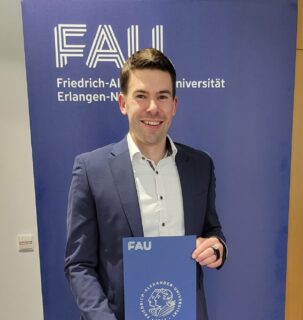Appointment of Prof. Dr. Karl Mandel to the Chair of Particle-Based Materials Chemistry
Appointment of Prof. Dr. Karl Mandel to the Chair of Particle-Based Materials Chemistry (PBMC), accompanied by the founding of the new Section for Materials Chemistry
Effective April 1, 2025, Prof. Dr. Karl Mandel has been appointed by FAU President Prof. Dr.-Ing. Joachim Hornegger to the Chair of Particle-Based Materials Chemistry (PBMC) at our Department. Since 2020, Karl Mandel has held a W2 professorship in Inorganic Chemistry, associated with the chair of Prof. Karsten Meyer.
With Karl Mandel’s appointment to the W3 professorship in Particle-Based Materials Chemistry, the Department of Chemistry and Pharmacy at FAU is also founding a new section: In addition to the classical disciplines within the Chemistry Unit—Inorganic, Organic, Physical, and Theoretical Chemistry—a fifth discipline, Materials Chemistry, is being established. This new section will be jointly supported by Prof. Mandel’s chair and the chair of Prof. Julien Bachmann (Chemistry of Thin Film Materials). By founding the Materials Chemistry section, the Department emphasizes the importance of materials science in line with FAU’s core research areas.
Materials Chemistry at FAU
In the future, the Section Materials Chemistry at FAU within the Department of Chemistry and Pharmacy aims to synthesize novel materials using smart chemical bottom-up approaches at the nanoscale. Given their multifunctional nature, these materials will contribute to strategically significant focus areas for the Department, such as “Energy,” “Sustainability,” and “Information”.
The section will focus on the design of complex small particles (nano- and supraparticles), thin films, and nanostructured 3D materials.
“The newly established Chair for Particle-Based Materials Chemistry will focus, within the Materials Chemistry section, on the development of highly functional supraparticles—particles just a few micrometers in size, composed of nanoparticles (and molecular building blocks). These complex constructs are created by forced assembly of (nano) building blocks, primarily using the technique of spray drying”, says Prof. Mandel.
“We investigate how the structure—as well as the (multi-material) composition—of these supraparticles influences the interactions among their constituent units, how these interactions can be controlled and steered, and how ultimately new and unique functionalities can be achieved. These findings will then be applied in the design of highly innovative communicating/interactive supraparticles and multifunctional adsorber/carrier and catalyst units.”
The chemical approach that defines Materials Chemistry in synthesizing functional materials fundamentally differs from classical materials engineering: The use of chemical bottom-up methods makes it possible to break through traditional material property limitations and achieve previously unthinkable functionalities through multimaterial, nanostructured architectures.
Materials Chemistry at FAU will operate in a highly interdisciplinary manner, connecting all areas of chemistry at the university—from molecular chemistry and physicochemical measurement techniques to, in the future, biomedical chemistry.
Contact
Prof. Dr. Karl Mandel
Department of Chemistry and Pharmacy
Chair of Particle-Based Materials Chemistry (PBMC)
- Phone number: +49 9131 85-27396
- Email: karl.mandel@fau.de

